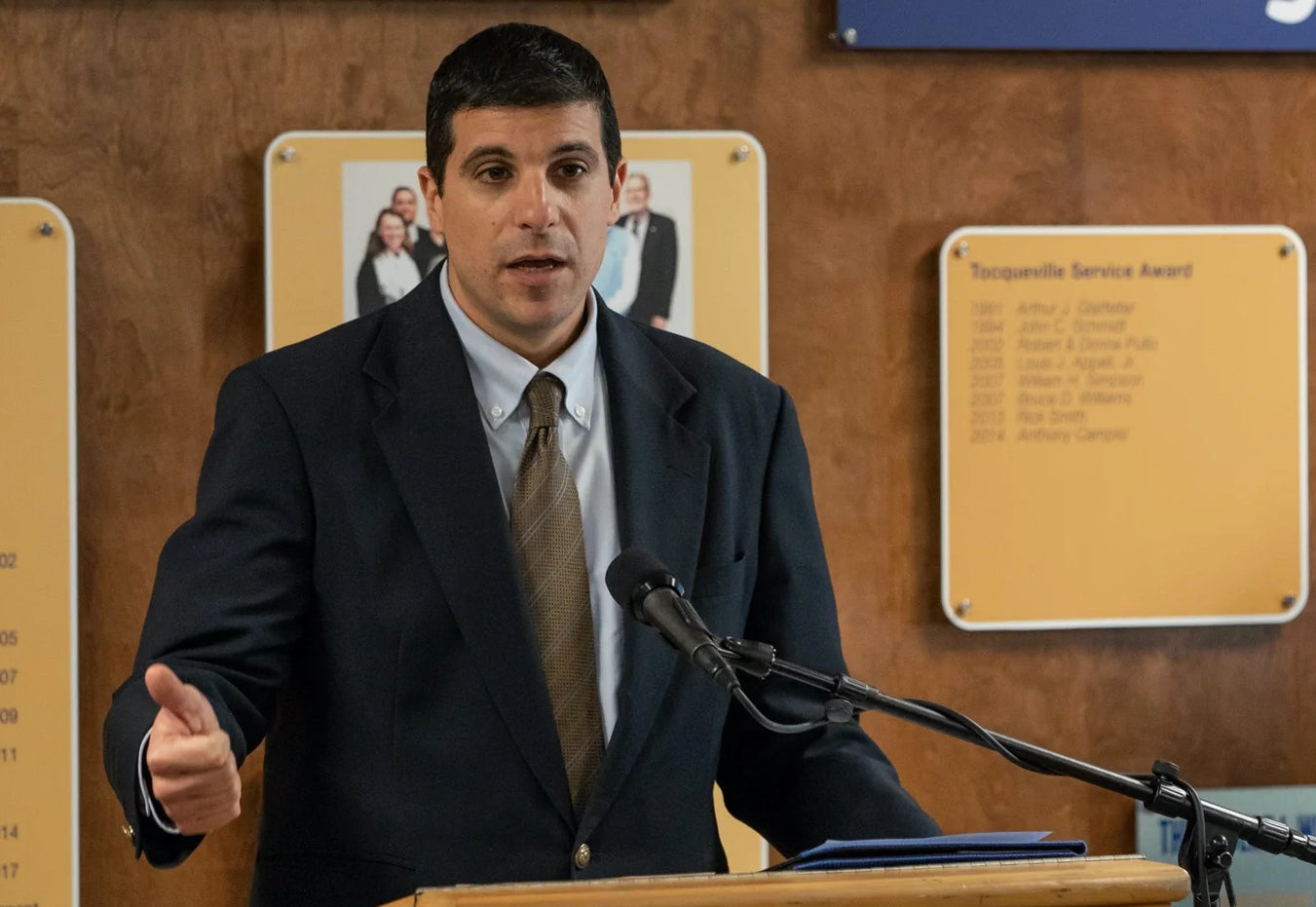Spotlight PA is an independent, nonpartisan newsroom powered by The Philadelphia Inquirer in partnership with PennLive/The Patriot-News, TribLIVE/Pittsburgh Tribune-Review, and WITF Public Media. Sign up for our free newsletters.
HARRISBURG — Pennsylvania Gov. Josh Shapiro is declining to make public his daily calendar, a policy that obscures many of the details about who he meets with and what they discuss.
The decision breaks from the practice of his predecessor, and is the latest choice by the new governor to roll back a transparency measure.
Pennsylvania’s Office of Open Records, an independent state agency that settles Right-to-Know Law disputes, recently ruled in Shapiro’s favor and found he does not need to share details about his schedule.
In response to a request for comment, Shapiro spokesperson Manuel Bonder wrote that the office “releases the Governor’s public schedule directly to reporters every day,” and that Shapiro “regularly visits communities all across Pennsylvania, taking questions from reporters and constituents alike, and he will continue to be accessible to the people of the Commonwealth.”
Bonder added that the office is following relevant open records rulings, and “will continue to balance personal safety and security with a high level of transparency.”
Calendars that go beyond a public schedule can offer a window into officials’ work, priorities, and close allies. They typically show which staffers, lawmakers, and nongovernment figures meet with the governor, when those meetings occur, and — in varying levels of detail — what is discussed.
Melissa Melewsky, media law counsel of the Pennsylvania NewsMedia Association — of which Spotlight PA is a member — said that although courts in the state have ruled that public officials have the right to share virtually no information about their days, Shapiro could decide to provide much more.
“The Right-to-Know Law still allows the governor to release these records,” Melewsky said. “He’s choosing not to.”
The administration’s calendar policy came to light due to an open records request from a pro-Republican organization that conducts opposition research on Democrats. The group, America Rising, filed a request asking for Shapiro’s work calendars shortly after his inauguration in January 2023.
Attorneys for the governor told the group that Shapiro’s calendars are personal, don’t have an official purpose, and are not shared widely within the office — an explanation that elected officials in Pennsylvania have frequently offered in response to calendar requests. Documents that meet these standards, the attorneys argued, should be categorized as “personal notes and working papers” and aren’t subject to the state’s Right-to-Know Law.
Citing Commonwealth Court cases from 2012 and 2014 involving officials from Philadelphia and the Pennsylvania Department of State, respectively, the OOR agreed.
Allan Blutstein, the America Rising senior vice president who requested Shapiro’s schedule, acknowledged that he did so for political reasons. The organization routinely requests Democratic governors’ calendars, especially early in their tenures, he told Spotlight PA.
But, Blutstein added, he thinks there is a nonpartisan argument for officials making records like calendars accessible.
“Constituents can see trends in terms of the kinds of organizations the governor is meeting with,” Blutstein said. “Who has access? Who has the governor’s ear? How often is the governor meeting with his staff in order to discuss issues one, two, and three?”
In their argument for not sharing calendars, Shapiro’s attorneys also said the documents contain information about personal medical appointments and identifying information about minors (the governor has young children), as well as information about his location that could compromise his safety.
Blutstein said the governor’s office could simply redact that information and provide only things relevant to state business. Government agencies often redact select information when responding to public document requests.
“I have no problem with redactions,” Blutstein said. “Here, we don’t even get to that point because the entire calendar is ruled personal.”
Blutstein said his organization hasn’t yet decided whether to appeal the OOR’s decision to Commonwealth Court.
Right-to-Know fights over calendars aren’t new in Pennsylvania.
During Republican Gov. Tom Corbett’s tenure from 2011 to 2015, his administration undertook a lengthy legal battle with an Associated Press reporter who requested calendars early in Corbett’s administration.
In that case, however, Corbett’s administration did provide some information. His office gave the reporter records showing who he met with, when, and where, but redacted meeting subjects.
That battle won the then-governor negative headlines. One editorial accused him of creating an anti-transparency “Fortress Corbett.” But Melewsky noted, he was still giving more information than Shapiro did.
“Corbett exercised more discretion than Shapiro is here,” she said.
When Wolf ran against Corbett, he made transparency a centerpiece of his campaign, at one point releasing a statement saying that Corbett had run “the least transparent administration in history” and specifically calling out Corbett’s calendar redactions.
“It all starts with a governor who actually wants transparency and openness,” Wolf told reporters shortly after his election.
Throughout his eight years in office, Wolf’s administration posted calendars at the end of each week that detailed what time Wolf arrived in Harrisburg and returned to his York County home, who he met with, and sometimes — but not always — what they discussed.
One Tuesday in the last year of Wolf’s tenure, for instance, saw him sit for an early radio interview, visit a Harrisburg daycare, swear in a deputy secretary, go with two deputy secretaries to a meeting with representatives of an Indian outsourcing company, and get an update from his secretary of legislative affairs.
This isn’t the first time that Shapiro has broken from Wolf on transparency.
As he prepared to enter office, Shapiro had members of his transition team sign nondisclosure agreements, and unlike his predecessors, he declined to name the private donors who had funded his inaugural celebration. He also loosened Wolf’s notoriously strict gift ban for top state officials.
Of Shapiro’s latest decision not to share calendar details, Melewsky noted that the governor has spent the past seven years running Pennsylvania’s attorney general’s office, which is largely exempt from state information laws.
“Maybe there’s a learning curve,” she said.
WHILE YOU’RE HERE… If you learned something from this story, pay it forward and become a member of Spotlight PA so someone else can in the future at spotlightpa.org/donate. Spotlight PA is funded by foundations and readers like you who are committed to accountability journalism that gets results.

/cloudfront-us-east-1.images.arcpublishing.com/pmn/2DD2TGCWBFAWXMEAHJM2NNIMMM.jpeg)






















/cdn.vox-cdn.com/uploads/chorus_asset/file/25822586/STK169_ZUCKERBERG_MAGA_STKS491_CVIRGINIA_A.jpg)

/cdn.vox-cdn.com/uploads/chorus_asset/file/25821992/videoframe_720397.png)



/cdn.vox-cdn.com/uploads/chorus_asset/file/23935558/acastro_STK103__01.jpg)
